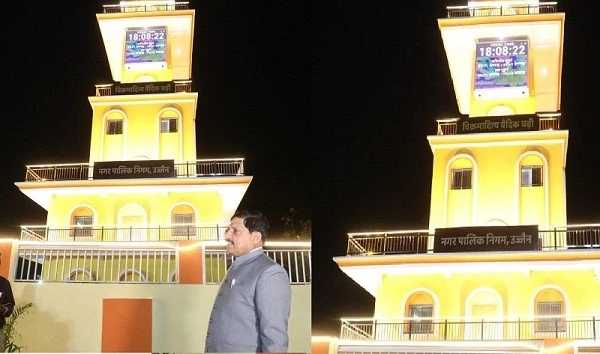Recently, PM Narendra Modi unveiled the ‘Vikramaditya Vedic clock’ in Madhya Pradesh’s Ujjain.
About Vikramaditya Vedic clock:
- The Vedic clock calculates time based on Vedic Hindu Panchang (time calculation system), planetary positions, Muhurat, astrological calculations, solar eclipse, and lunar eclipse, among other things.
- The clock is installed on an 85-foot high tower constructed at Jantar Mantar in Ujjain, adjacent to the Government Jiwaji Observatory.
- It will be the world’s first clock in which Indian time calculation will be displayed.
- The clock will calculate time from one sunrise to another.
- The period between the two sunrises will be divided into 30 parts whose one hour consists of 48 minutes.
- The reading will start from 0:00 with the sunrise functions for 30 hours.
- It has been developed by the Lucknow-based Sanstha Arohan, using digital interventions, enabling it to be connected to the internet and provide a wide range of features through a mobile app named after the clock.
Why Ujjain?
- According to experts, the standard time of the world was determined from Ujjain 300 years ago.
- Before 82.5E longitude was adopted for IST, Ujjain (75.78E) was considered as Bharat’s time meridian.
- The city determined the nation’s time zones and time difference, according to Hindu astronomical belief.
- The Vikrami Panchang and Vikram Samvat calendars are also released from Ujjain, which makes Ujjain the ideal location to have the Vaidik Clock.
- Ujjain is situated exactly where the Tropic of Cancer and Zero Meridians meet.
Indian system of time calculation:
- The Indian system of time calculation is the oldest, subtle, pure, error-free, authentic and reliable method in the world
- The shortest fraction of time is included in Indian time calculations based on the Indian astronomical theory and the motions of planetary constellations.
About Jantar Mantar:
- The Jantar Mantar is an ancient equinoctial sundial observatory built in India between 1724 and 1735.
- It is the oldest observatory in India, which Sawai Jai Singh II of Jaipur constructed in the early 1700s.
- It is located in five cities: Delhi, Mathura, Varanasi, Jaipur, and Ujjain.
- In 2010, the observatory in Jaipur was designated a UNESCO World Heritage Site.
| UPSC IAS Preparation Resources | |
| Current Affairs Analysis | Topperspedia |
| GS Shots | Simply Explained |
| Daily Flash Cards | Daily Quiz |



